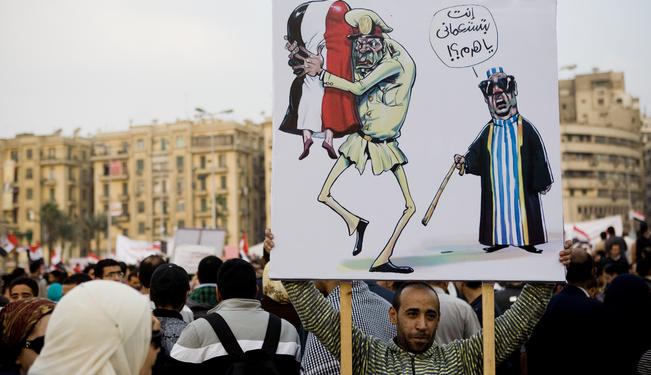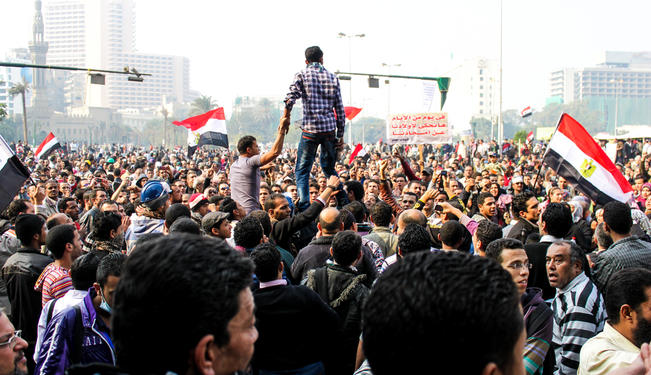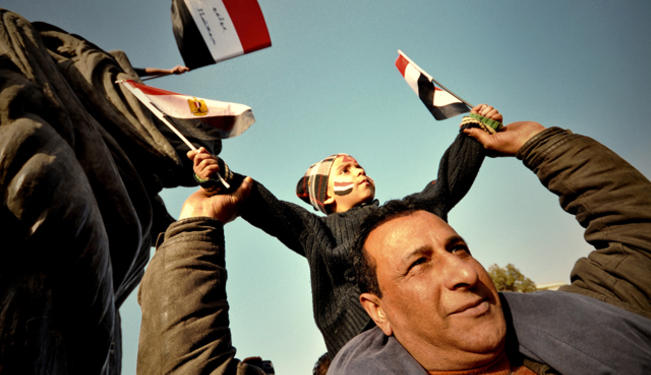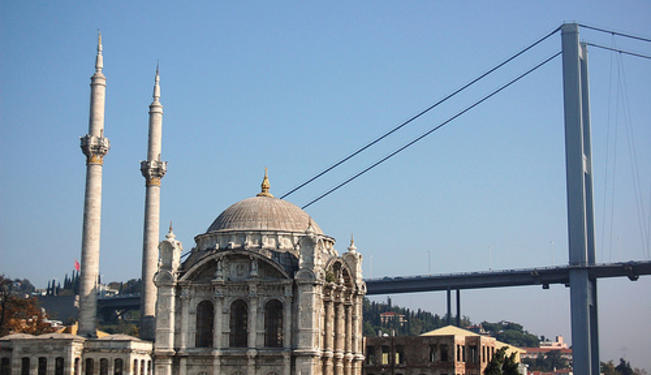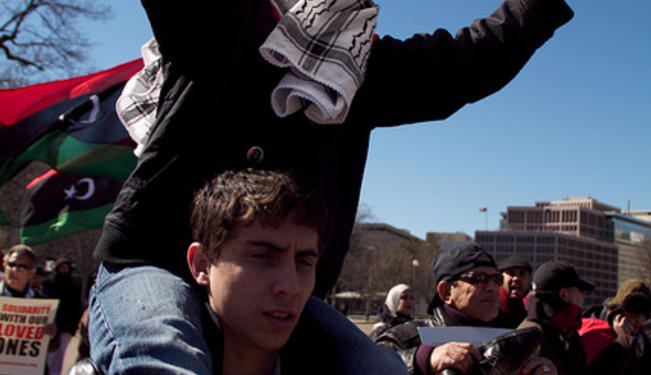Rajai Masri explains the complex reality of the Arab world amidst the potential for real change.
One is coming to the conclusion that the “objective circumstances,”Al-Zorouf Al-Mawdouieh, are not ripe. The lack of political maturity among Arabs cannot lead to a constructive and orderly transformation or a change in the socio-political structure of the Arab world, at this particular juncture in history. The Arabs’ bid for change, under the rubric of the Arab Spring, is spiraling out of control, becoming chaotic, enduring, and is ultimately prone to hijacking by the better organized Islamic factions under a theocratic dictatorship.
Now the Arab Spring, once seen as the spark for an orderly change in the Arab world for the better, increasingly appears to be drifting towards Bernard Lewis’ theory of “Creative Chaos,” or Al-Fawdah Al-Khallakah. And with it comes all the hegemonic connotation in the imperialists’ designs aimed at causing further split and fragmentation to an already divided Arab world.
The Complexity of the Arab world
Five inherent realities render bids for sweeping socio-political change in the Arab world chaotic, unmanageable and open to exploitation. One can sum up these dominant realities, at the expense of oversimplification, into the following five factors:
- The heterogeneity of the make-up of an Arab world with differing ethnicities and sectarian identities, lacking commonality of national aspirations and common national objectives.
- The total absence of a tradition of democracy; namely the absence of organized opposition into political parties due to the long-rule of absolute dictatorships.
- The relative low level of education; high levels of illiteracy; and spread of poverty that render the trodden masses more prone, through the force of the democratic principle of one-man, one-vote, to favoring one political faction — namely the Islamists who happen to employ more organized charitable networks among the less privileged neighborhoods.
- The absence of a unifying ideology and consensus over a long-term plan for the shape of an inclusive, future political system.
- The pre-emptive intervention by a long, dominant coalition of imperialist, Zionist and reactionary forces to thwart any attempts of genuine political transformation and Arab revival that could ultimately lead to Arab unity under a single political system.
The Arab world, unlike the French of the times of la Chute de la Bastille, is comprised of a constellation of ethnicities and sects that were often coerced and lumped together under the umbrellas of succeeding Islamic Caliphates ruling under the banner of religion, relevant to the spirit and mode of ancient times. These ethnicities and followers of varying religious sects were glued into one political entity under the rule of a dictatorial political system: the Caliphate.
In reality, under the single empire rule of the Caliphate, Kurds, Berber, Assyrians, Christians, Sunnis, Druze, Alawites, and so on, were never included under one coherent and homogeneous nationality. As with the example of Jews in the European ghettos, each of these ethnicities and sects kept at the micro-level to their distinct system of values and distinct sub-culture; a separate sense of identity.
Gamal Abdul Nasser’s outcry for Arab nationalism in the middle of the twentieth century, while rallying secularist Arabs under its banner, tended to alienate significant minorities of non-Arabs such as Kurds, Berbers and Assyrians.
Political Islam and Western Imperialist Powers
Today, with political Islam becoming a dominant force in the new emerging Arab Spring Middle East, an Islamic Sunni-sect colored dictatorship, dominating the political landscape of the Arab world, would implicate the disenfranchisement of the Christians, Shiite, Druze, Alawites, and other non-Sunni minorities in the wide religious spectrum of the Arab world. That, in all cases, would become untenable; it would lead to never-ending communal and social strife.
The Western imperialist powers, ever present under the cloak of a new nomer, similar to a chameleon, have vested interests in the strategically important Middle East; a wide geographic location that commands the gateways to important passages in some of the world’s vital waterways, and whose countries are sitting on much coveted energy reserves.
Israel, which was purposefully created as an outpost to protect Western imperialist interests and to act as a wedge to foil projects of Arab unity and revival, has since its creation assumed a life of its own with a separate vision and political agenda that often overrules the dictates and ultimate interests of its Western creators. Israel sees an orderly transformation of the Arab world (i.e. socio-economic and socio-political revival of the region),, as a zero-sum game; a mutually exclusive formula negating the Zionist doctrine and the exclusively Jewish character of the state. In addition, indigenous breeds of Arab intelligentsia, whose material interests are inextricably interwoven with foreign interests, are rendered as collaborating partners in aborting any Arab bids for revival.
Dominating Trends
Political transformation in the Arab world is a necessity dictated by the laws of evolution; the abysmal socio-economic state that the Middle East has descended into, cries for the right of self-determination and self-betterment in all aspects of life. It is long overdue, yet, the lack of a common ideology and the inherent ethno-sectarian divisions, aside from the imperialist-Zionist designs to foil genuine indigenous bids for profound reforms in the region, point to the inevitable dominance of one of two trends:
- Theocratic dictatorship, such as the unfolding political projects in Egypt, Libya and Tunisia
- Revival of the non-threatening stand-alone "Single State Model"
The first trend would lead to absolute dictatorship, theocratic and reminiscent of the Middle Ages. However, it runs completely against the spirit of our time, and against the universality and the increasingly open world we are living in.
Nevertheless, given the current objective circumstances and the varied ethno-sectarian makeup of an extended Arab world, and the stronghold that the imperialist –Zionist camp still enjoys over the fate of the region, single Arab states could in the short-term pursue their independent programs of genuine political reforms.
One could term this the “Revival of the Single State Model.” The initial political reforms enacted in Morocco, functioning as a prelude to gradually introduce genuine political reforms until the implementation of a truly functioning democracy, is a case in point.
If each Arab state succeeds in enacting profound socio-political reforms and true democracy is established, at that stage, the Arab world can collectively link together under a more unified political system by virtue of the greater homogeneity of reformed political systems achieved at the state level. Otherwise, the Arabs will continue to spin their wheels, simultaneously attempting a national political reform process as a harbinger for profound socio-economic reforms.
As a state of chaos, internecine strife, mayhem, and enduring instability could prove wasteful and counterproductive.
The views expressed in this article are the author's own and do not necessarily reflect Fair Observer’s editorial policy.
For more than 10 years, Fair Observer has been free, fair and independent. No billionaire owns us, no advertisers control us. We are a reader-supported nonprofit. Unlike many other publications, we keep our content free for readers regardless of where they live or whether they can afford to pay. We have no paywalls and no ads.
In the post-truth era of fake news, echo chambers and filter bubbles, we publish a plurality of perspectives from around the world. Anyone can publish with us, but everyone goes through a rigorous editorial process. So, you get fact-checked, well-reasoned content instead of noise.
We publish 2,500+ voices from 90+ countries. We also conduct education and training programs
on subjects ranging from digital media and journalism to writing and critical thinking. This
doesn’t come cheap. Servers, editors, trainers and web developers cost
money.
Please consider supporting us on a regular basis as a recurring donor or a
sustaining member.
Support Fair Observer
We rely on your support for our independence, diversity and quality.
Will you support FO’s journalism?
We rely on your support for our independence, diversity and quality.


